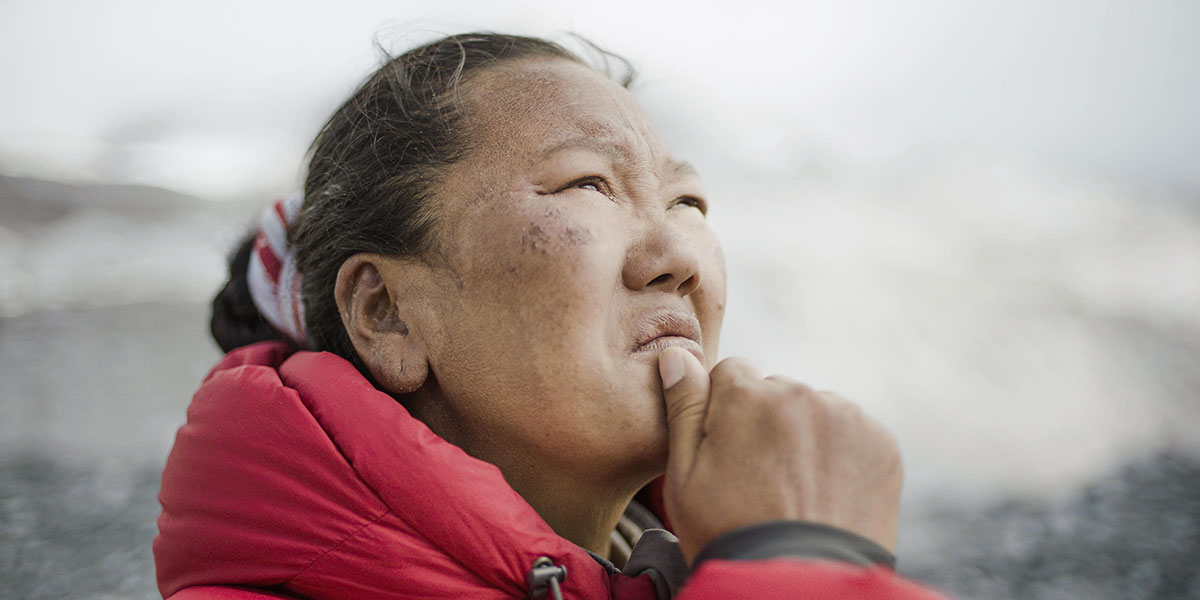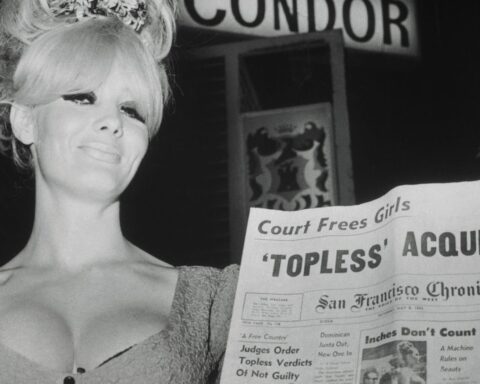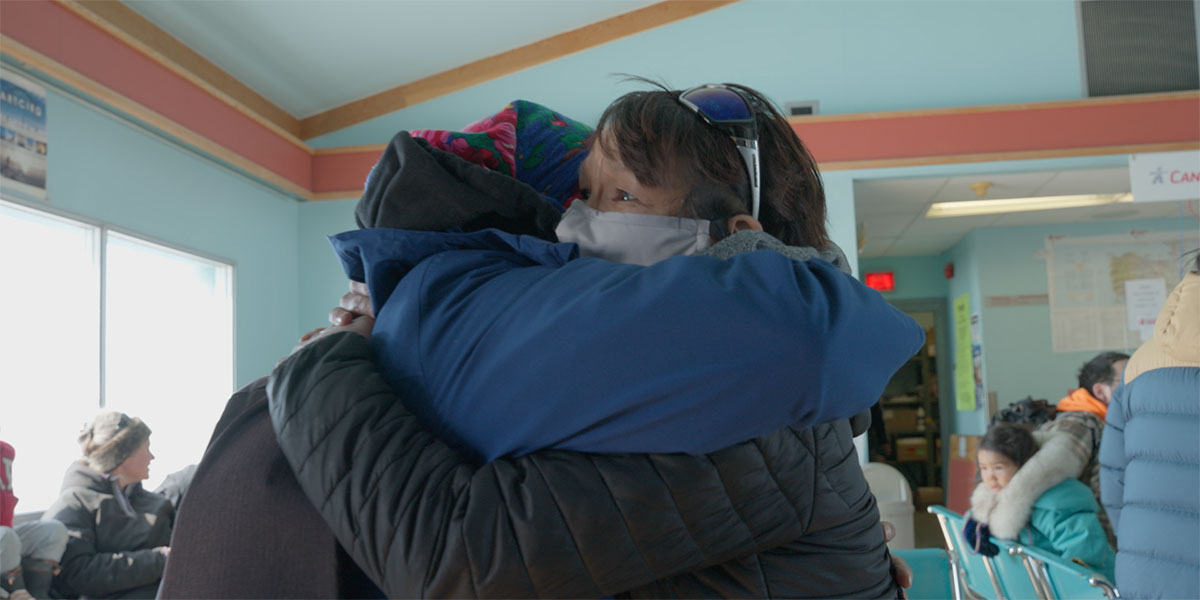Mountain Queen: The Summits of Lhakpa Sherpa
(USA, 111 min.)
Dir. Lucy Walker
Programme: TIFF Docs (Work in Progress)
“Everest is my doctor,” says Lhakpa Sherpa in Mountain Queen. She’s the first woman to summit Mount Everest ten times and now she’s destined to be one of the great documentary characters. This extraordinary documentary by Lucy Walker (The Crash Reel) brought the house down during a public screening of the work in progress documentary at this year’s Toronto International Film Festival. With multiple bursts of applause throughout the screening and a thunderous response at the film’s end, one can safely say that Lhakpa Sherpa is good medicine for all. Mountain Queen: The Summits of Lhakpa Sherpa offers an invigorating tale of strength and perseverance. Whether you’re most at home in the great outdoors or are an unabashed, comfort- seeking city dweller, it’s impossible not to answer the call of the wild that Mountain Queen summons.
Walker affords Sherpa a well-deserved profile that salutes her epic triumphs. Sherpas humble standing give the portrait an immediate hook, but also opens the story so that many people will see themselves in Lhakpa’s drive to simply live her dreams and be the best example she can set for her loved ones. Sherpa, for example, works as a dishwasher at a Whole Foods in Connecticut when the story begins. The high-end grocery store offers her lone training ground. Lifting steam trays and washing cutlery affords a workout to keep her lungs healthy and legs strong for the next climb. Her job also illustrates her humility. Lhakpa works seven days a week to provide for her two daughters, Sunny and Shiny (she also has an older son who lives on his own). She’s unwaveringly devoted to giving her girls the opportunities she could never enjoy in her native Nepal.
Back to Everest
The narrative core of Mountain Queen follows Sherpa as she embarks on her tenth summit. She brings Shiny with her to Everest, while the moody Sunny gives her the silent treatment and stays at home. However, Shiny admits to Walker that she doesn’t appreciate how cool her mom is. She confesses her embarrassment about living in a small apartment and doesn’t tell peers of her mom’s accomplishments at school. By the end of their awesome journey, though, Shiny becomes totally inspired by her mother’s tenacity and strength.
The film crosscuts Sherpa’s latest summit with the journeys that preceded it. She tells Walker about growing up in her village where girls could aspire to do little more than raise their brothers, and then tend to their husbands. But even from childhood, her story is one of physical and spiritual strength. She recalls carrying her brother two hours to school because he, as the boy, was too precious to risk injury en route to an education. “I make good yellow bus,” Lhakpa laughs. Nothing breaks her spirit.
She shares the pull of the wild that and the serenity she found in nature. Work, she tells Walker, came when she cut her hair and passed as a boy. Eventually, she became the best yellow bus on Mount Everest. Guiding thrill-seeking climbers, she surpassed everyone’s expectations, rising quickly from kitchen hand to star guide at a time when no women were Sherpas. As she remembers summiting Everest for the first time, Sherpa evokes the sensation that she touched the sky.
A Tragic Romance
Mountain Queen then adds a tragic love story to Sherpa’s tale. Her daughters allude to their father’s dark side early in the film, but the way the tale unfolds, the violence is jarring. Sherpa’s interview with Walker introduces her relationship with her late husband, Gheorghe Dijmărescu. Sherpa remembers the Romanian-American climber making a pass at her on Everest and returning a year later to summit the mountain with her. Sherpa’s story with Dijmărescu evokes a too-good-to-be true whirlwind romance. United by their love for the mountains, they could push each other to new limits.
Lhakpa remembers testing these limits when she moved to Connecticut with Dijmărescu to start a life together. In a foreign land with no education and no grasp for English (she inadvertently picked up some Romanian though), she found herself exploring new terrain. Walker conveys the turbulent relationship between Lhakpa and Gheorghe through their trips to Everest. Much like the mountain winds, Gheorghe could turn quickly and dangerous. Lhakpa shares how these winds often trapped her, nearly bringing the same icy fate that some climbers on Everest encounter.
The film introduces author Michael Kodas, who reported on a summit with Sherpa, Dijmărescu, and a team. Late published in the book High Crimes, Kodas’ story documents Dijmărescu’s volatile behaviour, which often put the group at risk. When Sherpa intervened to be the voice of reason, Dijmărescu beat her. The images that Kodas took are startling, but Sherpa almost seems violated by their existence even though they helped extricate her from a volatile relationship. She tells how the violence continued for years, with a drunken row by Gheorghe on their daughter’s birthday giving Lhakpa the wake-up she needed.
A Survivor’s Story
While the climb is the hook, Walker finds in Sherpa’s story an incredible tale of the motivation to keep going. Mountain Queen intricately structures Lhakpa’s story by crosscutting the 2022 summit with footage of Sherpa shot circa 2000 for another documentary. In the archives, Sherpa offers her hopes and dreams. The film builds upon her fortitude to keep putting one foot forward after another and keep climbing the mountain. Her master interview with Walker provides additional insight and heart. She’s very funny, quick-witted, imperfect, and insightful–everything a person could want in a great star for a documentary. She’s just a force as a character.
Moreover, by including the full story of Lhakpa’s journey that makes her tenth climb so significant, the film builds a strong emotional drive as she reaches the summit. More than ever, she’s proving her strength to herself. At the same time, Mountain Queen makes clear why Sunny isn’t happy with her mother’s expedition: if she succumbs to the mountain, these girls lose their protector, their rock. Shiny frequently makes video calls with her sister from afar, and their united by their concerns and pride.
The stakes are high, and Mountain Queen appropriately captures the dizzying risks of the summit. Walker, returning to Everest after her 2006 film Blindsight, captures the epic physical and emotional scope of this journey. One goes along the ascent with Sherpa thanks to expert cinematography by Devin Whetstone and Matthew Irving, the latter of whom shot the summit alongside Sherpa with four other Sherpas recording footage along the way. If climbing Everest is one of the biggest accomplishments in human adventure, doing it with a camera and capturing it so beautifully is no easy feat.
As far as mountain movies go, no doc has ever captured Everest quite like Mountain Queen. The details of Everest are on full display here: the attitude, the grade, the wind, and the cold, but most significantly, the spiritual power that fuels Lhakpa. This exhilarating film should make many mountain queens by inspiring viewers to conquer the impossible.
Mountain Queen premiered at the 2023 Toronto International Film Festival.
Get more coverage from this year’s festival here.













